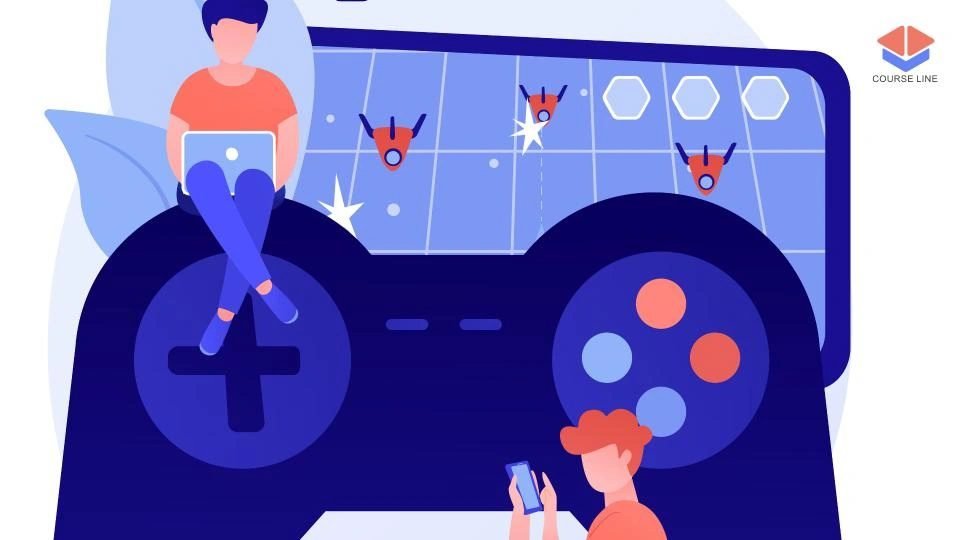Course Features
Price
Study Method
Online | Self-paced
Course Format
Reading Material - PDF, article
Duration
15 minutes
Qualification
No formal qualification
Certificate
At completion
Additional info
Coming soon
- Share
Overview
T Level Digital Production: Design & Development Foundations provides students with in-depth knowledge and real-world skills needed to succeed in the digital technology landscape. Through hands-on projects and structured lectures, students learn how digital systems are built and maintained, from early-stage requirement gathering to development and deployment. Whether it's understanding algorithms, writing clean code, managing data, or designing user-friendly interfaces, learners will gain a holistic view of digital product creation.
The course begins by exploring the broader digital sector, ethical issues, cybersecurity concerns, and the role of regulation like GDPR in digital projects. Learners are introduced to industry expectations and the significance of professional behaviours in tech placements. The software development lifecycle is broken down into manageable stages, allowing students to master planning, designing, testing, and deployment through Agile and Waterfall approaches.
As the course progresses, students build confidence in programming with variables, loops, functions, and project structures. They learn how to design functional websites using HTML, CSS, and JavaScript, and understand both the front-end and back-end considerations. Important UX principles, such as accessibility and user research, are taught alongside digital design tools and prototyping techniques to foster inclusive development practices.
Further, learners explore how data is structured and queried using SQL, how APIs connect systems, and how version control tools like Git streamline teamwork. The course wraps up with a capstone project, where students apply their skills to design and build a complete digital solution, document their workflow, and create a portfolio to present to future employers or academic institutions.
Who is this course for?
T Level Digital Production: Design & Development Foundations provides students with in-depth knowledge and real-world skills needed to succeed in the digital technology landscape. Through hands-on projects and structured lectures, students learn how digital systems are built and maintained, from early-stage requirement gathering to development and deployment. Whether it's understanding algorithms, writing clean code, managing data, or designing user-friendly interfaces, learners will gain a holistic view of digital product creation.
The course begins by exploring the broader digital sector, ethical issues, cybersecurity concerns, and the role of regulation like GDPR in digital projects. Learners are introduced to industry expectations and the significance of professional behaviours in tech placements. The software development lifecycle is broken down into manageable stages, allowing students to master planning, designing, testing, and deployment through Agile and Waterfall approaches.
As the course progresses, students build confidence in programming with variables, loops, functions, and project structures. They learn how to design functional websites using HTML, CSS, and JavaScript, and understand both the front-end and back-end considerations. Important UX principles, such as accessibility and user research, are taught alongside digital design tools and prototyping techniques to foster inclusive development practices.
Further, learners explore how data is structured and queried using SQL, how APIs connect systems, and how version control tools like Git streamline teamwork. The course wraps up with a capstone project, where students apply their skills to design and build a complete digital solution, document their workflow, and create a portfolio to present to future employers or academic institutions.
Requirements
T Level Digital Production: Design & Development Foundations provides students with in-depth knowledge and real-world skills needed to succeed in the digital technology landscape. Through hands-on projects and structured lectures, students learn how digital systems are built and maintained, from early-stage requirement gathering to development and deployment. Whether it's understanding algorithms, writing clean code, managing data, or designing user-friendly interfaces, learners will gain a holistic view of digital product creation.
The course begins by exploring the broader digital sector, ethical issues, cybersecurity concerns, and the role of regulation like GDPR in digital projects. Learners are introduced to industry expectations and the significance of professional behaviours in tech placements. The software development lifecycle is broken down into manageable stages, allowing students to master planning, designing, testing, and deployment through Agile and Waterfall approaches.
As the course progresses, students build confidence in programming with variables, loops, functions, and project structures. They learn how to design functional websites using HTML, CSS, and JavaScript, and understand both the front-end and back-end considerations. Important UX principles, such as accessibility and user research, are taught alongside digital design tools and prototyping techniques to foster inclusive development practices.
Further, learners explore how data is structured and queried using SQL, how APIs connect systems, and how version control tools like Git streamline teamwork. The course wraps up with a capstone project, where students apply their skills to design and build a complete digital solution, document their workflow, and create a portfolio to present to future employers or academic institutions.
Career path
T Level Digital Production: Design & Development Foundations provides students with in-depth knowledge and real-world skills needed to succeed in the digital technology landscape. Through hands-on projects and structured lectures, students learn how digital systems are built and maintained, from early-stage requirement gathering to development and deployment. Whether it's understanding algorithms, writing clean code, managing data, or designing user-friendly interfaces, learners will gain a holistic view of digital product creation.
The course begins by exploring the broader digital sector, ethical issues, cybersecurity concerns, and the role of regulation like GDPR in digital projects. Learners are introduced to industry expectations and the significance of professional behaviours in tech placements. The software development lifecycle is broken down into manageable stages, allowing students to master planning, designing, testing, and deployment through Agile and Waterfall approaches.
As the course progresses, students build confidence in programming with variables, loops, functions, and project structures. They learn how to design functional websites using HTML, CSS, and JavaScript, and understand both the front-end and back-end considerations. Important UX principles, such as accessibility and user research, are taught alongside digital design tools and prototyping techniques to foster inclusive development practices.
Further, learners explore how data is structured and queried using SQL, how APIs connect systems, and how version control tools like Git streamline teamwork. The course wraps up with a capstone project, where students apply their skills to design and build a complete digital solution, document their workflow, and create a portfolio to present to future employers or academic institutions.
-
-
- Premium Certificate 00:15:00

No Reviews found for this course.
Is this certificate recognized?
Yes, our premium certificate and transcript are widely recognized and accepted by embassies worldwide, particularly by the UK embassy. This adds credibility to your qualification and enhances its value for professional and academic purposes.
I am a beginner. Is this course suitable for me?
Yes, this course is designed for learners of all levels, including beginners. The content is structured to provide step-by-step guidance, ensuring that even those with no prior experience can follow along and gain valuable knowledge.
I am a professional. Is this course suitable for me?
Yes, professionals will also benefit from this course. It covers advanced concepts, practical applications, and industry insights that can help enhance existing skills and knowledge. Whether you are looking to refine your expertise or expand your qualifications, this course provides valuable learning.
Does this course have an expiry date?
No, you have lifetime access to the course. Once enrolled, you can revisit the materials at any time as long as the course remains available. Additionally, we regularly update our content to ensure it stays relevant and up to date.
How do I claim my free certificate?
I trust you’re in good health. Your free certificate can be located in the Achievement section. The option to purchase a CPD certificate is available but entirely optional, and you may choose to skip it. Please be aware that it’s crucial to click the “Complete” button to ensure the certificate is generated, as this process is entirely automated.
Does this course have assessments and assignments?
Yes, the course includes both assessments and assignments. Your final marks will be determined by a combination of 20% from assignments and 80% from assessments. These evaluations are designed to test your understanding and ensure you have grasped the key concepts effectively.
Is this course accredited?
We are a recognized course provider with CPD, UKRLP, and AOHT membership. The logos of these accreditation bodies will be featured on your premium certificate and transcript, ensuring credibility and professional recognition.
Will I receive a certificate upon completion?
Yes, you will receive a free digital certificate automatically once you complete the course. If you would like a premium CPD-accredited certificate, either in digital or physical format, you can upgrade for a small fee.
Course Features
Price
Study Method
Online | Self-paced
Course Format
Reading Material - PDF, article
Duration
15 minutes
Qualification
No formal qualification
Certificate
At completion
Additional info
Coming soon
- Share
CACHE: Working with Children in the Foundation Stage (EYFS)
Course Line237£490.00Original price was: £490.00.£14.99Current price is: £14.99.OCD Treatment Options: From Therapy to Medication
Course Line238£490.00Original price was: £490.00.£14.99Current price is: £14.99.Game Design Level 3 Advanced Diploma
Course Line241£490.00Original price was: £490.00.£14.99Current price is: £14.99.
Related Courses
T Level Digital Business Services: Analytics & Insight Essentials
£490.00Original price was: £490.00.£14.99Current price is: £14.99. 237
237T Level Science: Laboratory Techniques & Data Handling
£490.00Original price was: £490.00.£14.99Current price is: £14.99. 237
237T Level Construction: Design, Surveying & the Built Environment
£490.00Original price was: £490.00.£14.99Current price is: £14.99. 237
237
Related Courses
T Level Digital Business Services: Analytics & Insight Essentials
£490.00Original price was: £490.00.£14.99Current price is: £14.99. 237
237T Level Science: Laboratory Techniques & Data Handling
£490.00Original price was: £490.00.£14.99Current price is: £14.99. 237
237T Level Construction: Design, Surveying & the Built Environment
£490.00Original price was: £490.00.£14.99Current price is: £14.99. 237
237








